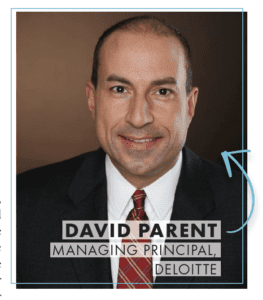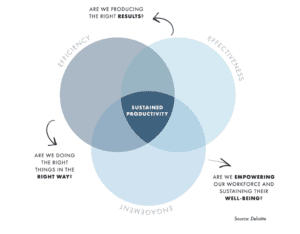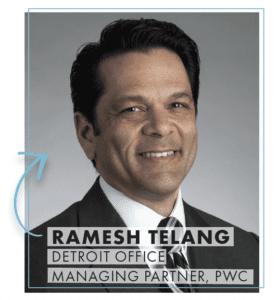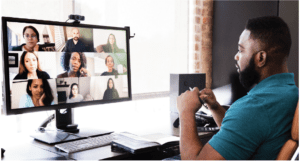From Pandemic to Endemic
April 28, 2021Designing Work with Employee Well-being and Productivity in Mind
While none of us would wish to relive the past 12 months, we learned that the “status quo” is no longer. If we embrace this freedom from the “this is the way we’ve always done it” trap, we may enter a new era that can provide opportunities for organizations and their people to forge new partnerships, including redefining expectations and opportunities for more efficient, effective, and flexible workforce practices, heightened focus on worker well-being, and new ways of unleashing organizational performance.
quo” is no longer. If we embrace this freedom from the “this is the way we’ve always done it” trap, we may enter a new era that can provide opportunities for organizations and their people to forge new partnerships, including redefining expectations and opportunities for more efficient, effective, and flexible workforce practices, heightened focus on worker well-being, and new ways of unleashing organizational performance.
How so? First, few things can be more demoralizing, especially to highly motivated and skilled workers, than spending time on low-value or unnecessarily tedious tasks. Over the past year, organizations had to eliminate such tasks where they existed, given fewer resources, less access to their offices, or because of greater reliance on technology. Organizations that take these learnings forward can achieve a “win-win” by improving the way work gets done and improving morale by focusing energy on work that truly matters.
The past twelve months also revealed something many already believed to be true: organizations with leaders who genuinely focus on the well-being of their people have team members reciprocate with greater levels of engagement, flexibility, and commitment. This expectation for leadership is not likely to fade away and will likely yield benefits to those organizations that cultivate it.
organizations with leaders who genuinely focus on the well-being of their people have team members reciprocate with greater levels of engagement, flexibility, and commitment. This expectation for leadership is not likely to fade away and will likely yield benefits to those organizations that cultivate it.
Finally, the pandemic reinforced many of the essential characteristics long-believed important to developing high-performing teams. Organizations that thrived during the pandemic were likely those that had a “head start” – clarity of purpose, commonly understood goals, customer-first mindsets, open communications, strong employee rewards and recognition, and a foundation of “trust” within and across teams.
If we can apply these lessons going forward, we may realize a new era of employee engagement that directly contributes to heightened levels of organizational performance.
David Parent is Managing Principal at Deloitte. As used in this document, “Deloitte” means one or more of Deloitte USA LLP, a subsidiary of Deloitte LLP. Please see www.deloitte.com/us/about for a detailed description of its legal structure.
By Ramesh Telang
Work Transformed in a Post-pandemic World
The events of 2020 led to a time of significant transformation, brought on by sweeping changes in consumer demand, with far-reaching implications for business and society. And as sentiment around future economic outlook begins to brighten, it comes with an understanding that there is no going back to the way things once were. We have seen a fundamental shift in the nature of how work gets done, with technology and the workforce at the epicenter.
changes in consumer demand, with far-reaching implications for business and society. And as sentiment around future economic outlook begins to brighten, it comes with an understanding that there is no going back to the way things once were. We have seen a fundamental shift in the nature of how work gets done, with technology and the workforce at the epicenter.
Regardless of industry or geographic location, daily workplace processes have been upended – whether it be with new workplace safety protocols, collaboration tools, or flexible work schedules. Our “forced” adoption of and reliance on technology for connectivity accelerated tech adoption at record speed. This increased our reliance on digital tools to execute daily work routines and in turn, created a new found comfort level of managing a remote workforce to deliver results.
This shift is here to stay and will continue to influence how work gets done, placing a heightened need for our workforce and the workforce of the future to start (or progress on) their journey of lifelong learning.
heightened need for our workforce and the workforce of the future to start (or progress on) their journey of lifelong learning.
We need to prepare our people to navigate new ways of working and help them to manage the pace at which new tools and technologies come to market. With 133 million new jobs requiring upskilling by 2022, employers have an obligation and a responsibility to invest in the backbones of our organizations, our employees, giving them the capabilities and confidence to work smarter, not harder, fueling citizen-led innovation.
Technology will be the foundation for everything we do and looking ahead, will require a digitized approach to how we deliver value for customers and our employees in a post-pandemic era.
Leaders have an opportunity to emerge stronger for business, a chance to rework existing strategies and identify areas to streamline and invest in. To do this, we must lean into the innovation from our workforce, leveraging it to drive real, collective, lasting change.
